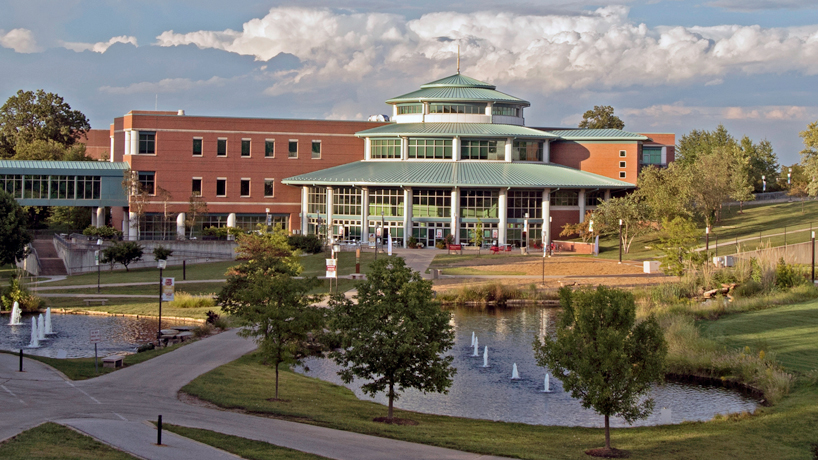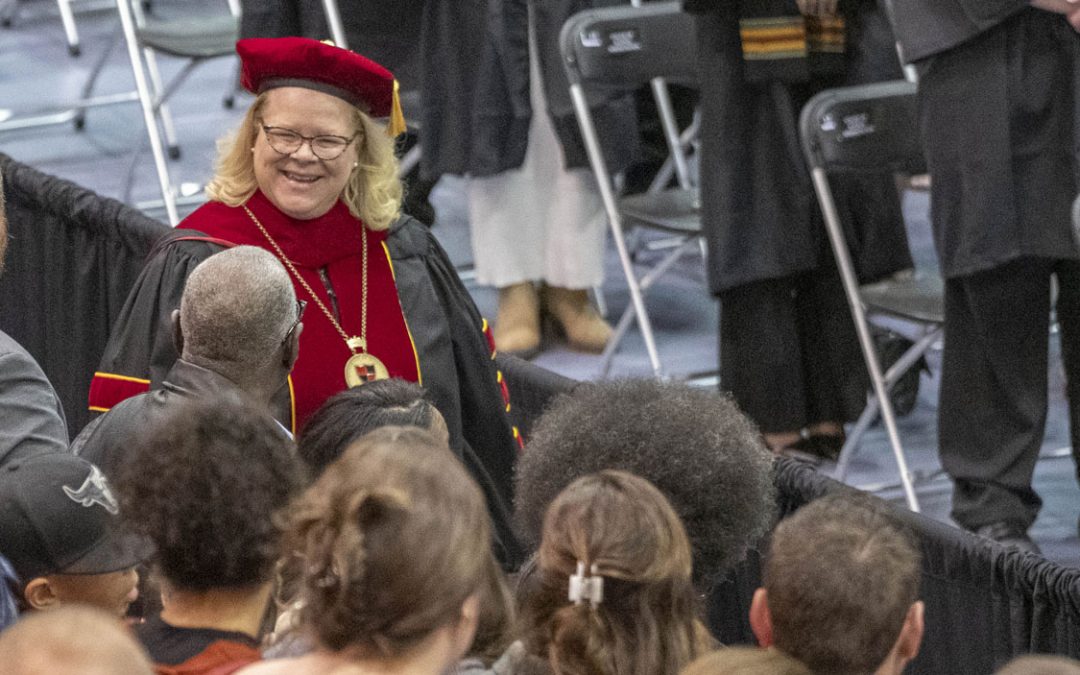
The University of Missouri Research Board awarded grants to 11 UMSL faculty members working on projects in psychological sciences, social work, counseling, supply chain and analytics, English and music. (Photo by August Jennewein)
University of Missouri–St. Louis researchers investigating topics as diverse as refugee resettlement; the underrepresentation of women and minorities in the fields of science, technology, engineering and mathematics; and drone delivery of potentially life-saving vaccines have found support from the University of Missouri Research Board.
The board earlier this month awarded a combined $183,576 in grants to 11 UMSL faculty members, aiding research in social science, humanities, business and art.
Those receiving funding are Bettina Casad, Michael Griffin, Joanna Mendoza, Stephanie Merritt, Scott Peterson, Kurt Schreyer and Matthew Taylor from the College of Arts and Sciences, James Campbell from the College of Business Administration, Emily Brown from the College of Education, Felia Davenport from the School of Fine and Performing Arts and Uma Segal from the School of Social Work.
“They really serve two purposes,” Vice Provost for Graduate Studies and Research Chris Spilling said of the Research Board awards. “One is for junior faculty – assistant professors – to give them an opportunity to hone their skills in applying for grants internally. The other is to seed projects that we hope will get external funding down the road.
“In some cases, it provides in areas where there really isn’t the opportunity to get external dollars – musical performances, writing novels, things that typically are very difficult to fund otherwise.”
Spilling noted that the UMSL awardees run the gamut from Campbell, a full professor with more than 30 years of experience and more than 60 publications, to Brown, in only her second year as an assistant professor in the Department of Education Sciences and Professional Programs.
Casad, an assistant professor of psychological sciences, received the largest award of $38,734 for her project, “Threatening Environments and Minorities in STEM.” She aims to investigate the effects of threatening intellectual environments in STEM classrooms. She hypothesizes that threatening environmental cues highlighting a stigmatized status, such as gender or race, lead to physiological and psychological events that result in depleted cognitive functioning, lower academic performance and reduced psychological well-being.
Segal, a professor of social work, and her co-investigator Davenport, who chairs UMSL’s theater department, won $37,410 for “Refugee Integration: Stories to Educate.” The project uses interviews and focus groups and is concentrated on the Syrian refugee population along with the communities where they have been or are being resettled.
The expectation is to develop six stories about the multifaceted nature of integration, and each will be used to increase refugee understanding of host country expectations, raise awareness of challenges facing refugees among service providers and give a realistic picture to the general public.
The analysis social work students do of interviews and focus groups is to be woven into stories created by creative writing and theater students. The stories are to be used to educate and sensitize constituent groups in the St. Louis region.
Brown has been awarded $34,084 for her research project, “Enhancing Support for CIP with Filial Therapy.” It aims to assess the effects of filial therapy – which trains parents to play therapists for their own children – for parents or guardians of children of incarcerated parents.
The training is to be offered to 40 such individuals as school sites in the St. Louis area during the 2019-20 academic year. The project, which will involve UMSL counseling students, has an objective to examine changes in the stress of caregivers after receiving filial therapy. It will also explore changes in attitudes of acceptance toward their children and examine changes in overall reported child behavior problems among children whose caregivers receive filial therapy.
Campbell, who chairs the supply chain and analytics department, received $23,840 for his project exploring “Can Drones Help Optimize the Vaccine Supply Chain?” The goal of Campbell’s work is to analyze the use of drones to deliver vaccines to less developed regions of the world that can be slow and difficult to reach otherwise.
Campbell’s research focuses on Vanuatu, a country consisting of 85 islands scattered over more than 1,000 miles of the South Pacific, which is currently testing drone delivery of vaccines. Many of the islands have no road or air access and only limited electricity.
The research can establish how modern technology and analytical supply chain and logistics tools might optimize global health care supply chains.
Research Board Awards
Emily Brown, counseling, “Enhancing Support for CIP with Filial Therapy,” $ 34,084
James Campbell, supply chain and analytics, “Can Drones Help Optimize the Vaccine Supply Chain?” $23,840
Bettina Casad, psychological sciences, “Threatening Environments and Minorities in STEM,” $38,734
Michael Griffin, psychological sciences, “Hypervigilance, Fatigue, and Arousal in PTSD,” $22,699
Joanna Mendoza, music, “Exploring New Soundscapes with Music Technology,” $4,899
Stephanie Merritt and Matthew Taylor, psychological sciences, “Was that Racist? Identifying Racial Microaggressions,” $4,680
Scott Peterson, English, “A Busher for All Seasons: Writing & Rewriting a Transit,” $10,000
Kurt Schreyer, English, “Shakespeare at Sea: Theatricality in the Royal Navy,” $7,230
Uma Segal, social work, and Felia Davenport, theater and cinema arts, “Refugee Integration: Stories to Educate,” $37,410














